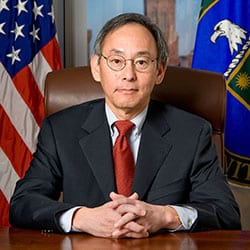Steven Chu – challenges and opportunities of climate change
By Oli Usher, on 1 April 2014
I’m sure Malcom Gladwell has something to say about Steven Chu. He is improbably successful in two totally different fields, and part of me wonders how he ever found the time to do it.
No sleep, perhaps?
Part-way through a stellar academic career in physics (including a Nobel Prize before he hit 50), Chu took a leave of absence.
In his four-year sabbatical, instead of sailing around the world or learning the violin like normal people might, he went to work for Barack Obama, serving as his Secretary of Energy until 2013, before heading back to a post at Stanford University when he was done.
In London to examine a physics PhD – Chu’s expertise is in laser cooling – he dropped by to offer a public lecture (Harrie Massey Lecture Theatre, 19 March) to a packed auditorium at UCL.
The topic: the challenges and opportunities of climate change – a subject he grappled with in his time in public office.
“Opportunities” is a slightly funny word to use – in the context of climate change, it usually pops up in communications from mildly sinister corporations who want to open up shipping routes in the Arctic or drill for oil in newly ice-free waters.
Chu’s world view is more optimistic: climate change is a major risk that is already affecting society, but the choices we make in how to tackle it have many silver linings.
Lessons from agriculture
Chu opens with an account of the transformation in farming in the late 20th century. In the 1960s, people were convinced that mass deaths from starvation would define the latter years of the 20th century. A population time-bomb was ticking, with no obvious solutions.
Yet solutions were found: thanks to artificial fertilisers and new higher-yield crops, agricultural output per acre of farmland quadrupled between 1960 and 2005 – a remarkable achievement known today as the Green Revolution.
Similarly in the early 20th century, motor cars very quickly replaced horses as the main mode of transport in cities, when the avalanche of horse manure and urine became too much to cope with. (Hard to imagine today that cars were initially a way of improving the environment, not degrading it.)
What both the emergence of motor cars and new crop strains have in common is not just that they solved pressing environmental issues (however imperfectly). It is that they also had positive effects.
Today, Chu says, we need a new green revolution, solving environmental problems while improving society.
Chu outlines the doom and gloom we are all used to – rising CO2 emissions, skyrocketing insurance claims, worsening weather events – and points out that if we hit the upper estimates from the Intergovernmental Panel on Climate Change, we are “in deep doo-doo”. (“This is a physical term,” he notes.)
But we all know about this alarming state of affairs. What we do about it is less clear – and here was some cautious good news.
A virtuous circle
Key to Chu’s upbeat argument is the idea that many of the solutions are actually good in and of themselves. In particular, new regulations to improve energy efficiency typically cut the costs of a technology – the opposite of what you might imagine.
As examples he cites refrigerators, washing machines and air-con units in particular, which saw declining prices even as environmental standards were toughened up – which in turn cuts electricity costs. A virtuous circle.
There remain plenty of low-hanging fruit, he suggests – cable TV set-top boxes in the US are monumentally inefficient, for instance, wasting $12bn worth of electricity annually.
Regulations – resisted by the companies involved – could reduce this by 95% without any trouble, he says. But all the companies are offering is more modest cuts of 10–45%. Enforced standards, Chu thinks, are a clear solution to this kind of market failure.
Elsewhere, energy production from renewable sources is fast becoming cheaper. In the next decade or two, he predicts wind power will be cheaper than energy from natural gas, and solar power has sharply fallen in price too.
Dispelling the gloom
The future need not be a gloomy place if we tackle these challenges properly.
Underlying all Chu’s argument is a fundamental truth (which he attributes to a former Saudi oil minister): the Stone Age didn’t end because stones ran out, it ended because something better came along.
The same will be true of our current era of fossil fuel dependence – and it must be, because with fracking, shale oil and tar sands coming on line, peak oil won’t save us.
Shortly after Obama’s re-election, Chu stepped down and returned to academia. His replacement: another overachiever with an impressive career as physics professor. And while he may not have a Nobel Prize, he does have better hair.
Watch the lecture below:
 Close
Close


